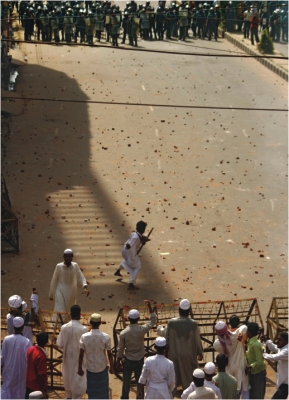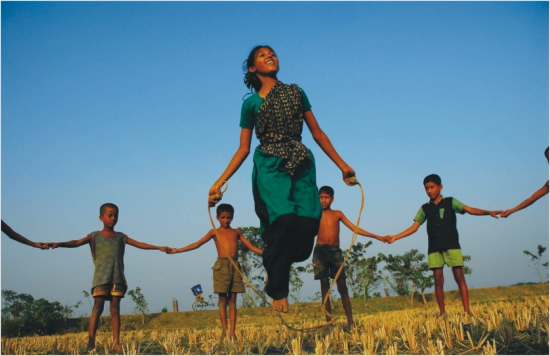
Inside
|
Lessons from the Women Development Policy Debacle Jyoti Rahman gives the rundown on what we can learn from the recent protests against women's rights As part of a program marking the International Women's Day, the government announced a National Women Development Policy on March 8. The announced policy was condemned by a section of Muslim clerics as un-Islamic. Specifically, the clerics objected to any possible change to the inheritance laws such that women could get equal inheritance rights as men. On March 11, the government announced that it had no intention of passing any law that is "anti-Islam." On March 27, the government formed a 20-member committee to identify inconsistencies in the policy as per Islamic rules and suggest steps to remove any such inconsistencies. While the committee deliberated, the clerical opposition continued.
Following the Friday prayers on April 11, violent protests broke out in Dhaka's Baitul Mukarram area. On April 17, the committee recommended that the government amend the announced policy, replacing any commitment to equality between the sexes with "just rights" for women. Let me state here an unequivocal commitment to equal rights -- irrespective of age, gender, ethnicity, or faith -- of all citizens, including equal property and inheritance rights for men and women. This piece is not about commitments to these rights. Nor is it about theological discussions about what Islam has to say on the matter. Rather, it is about some lessons to be drawn from the developments described in the first paragraph. Lesson 1: Or perhaps it is none of these. Perhaps the Women Development Policy is just what it claims to be -- a commitment to women's rights in every sphere of life. After all, this was the stated objective of women policies of the two previous governments, too. No one claimed that those governments had some ulterior motives. Let's give the government benefit of the doubt. But even if there were no ulterior motives, events have shown that as soon as there was an organised political resistance against the policy, the government compromised. The Islamists, of course, have their own agenda. They oppose the very idea of gender equality on ideological grounds. And they saw an opportunity to project their strength, and gain "control" of the streets through their protests. And even if there was no ulterior motive behind the policy as such, the government has other agenda -- a peaceful election at the end of the year and the handover of power to an elected government is the stated one. And this stated agenda is more important to the government than the Women Policy. Political imperatives are always more important than specific policies. Politics is supreme, that's the lesson here. Anyone naive enough to think that a technocratic government will "do the right thing" without paying heed to political calculations should get their head out of sand. Lesson 2: Seminars and roundtables organised and attended by the elites in Dhaka's posh locations are no substitute for political coalitions. Lesson 3: So long as a substantial number of people follow such interpretations of the Quran, there will be many with apprehensions. The only way to assuage such apprehension is through open dialogue and active consultation that stresses that the proposed policy would not in any way stop anyone from practising their faith.
Lesson 4: Specific to the case of Women Policy, let's not make any assumption about the government's popularity or forecast how the current political situation will unfold. Instead, let's consider this: if the current emergency ends in a political crisis, the successor government will feel compelled to move away from the policies enacted by this government, regardless of the policies' merits as such. As long as the opponents of the Women Policy remain organised and vocal, and the supporters remain confined to the seminars, the successor government will find it very easy to scrap the policy to distance itself from this government. Indeed, even if a popularly elected government pushes through a controversial policy without appropriate coalition building and public consultation, the policy will probably be rescinded by some successor government. While the above lessons apply to any major policy in Bangladesh and beyond, the following lessons are more specific to the current Bangladesh. Lesson 5:
Lesson 6: Lesson 7: 1. An example of such a conversation can be found here: http ://rumiahm-ed.wordpress.com/2008/03/09/a-fight-we-can-not-afford-to-lose/ Jyoti Rahman is a blogger and a member of the Drishtipat Writers' Collective. He can be contacted at dpwriters@drishtipat.org. |


